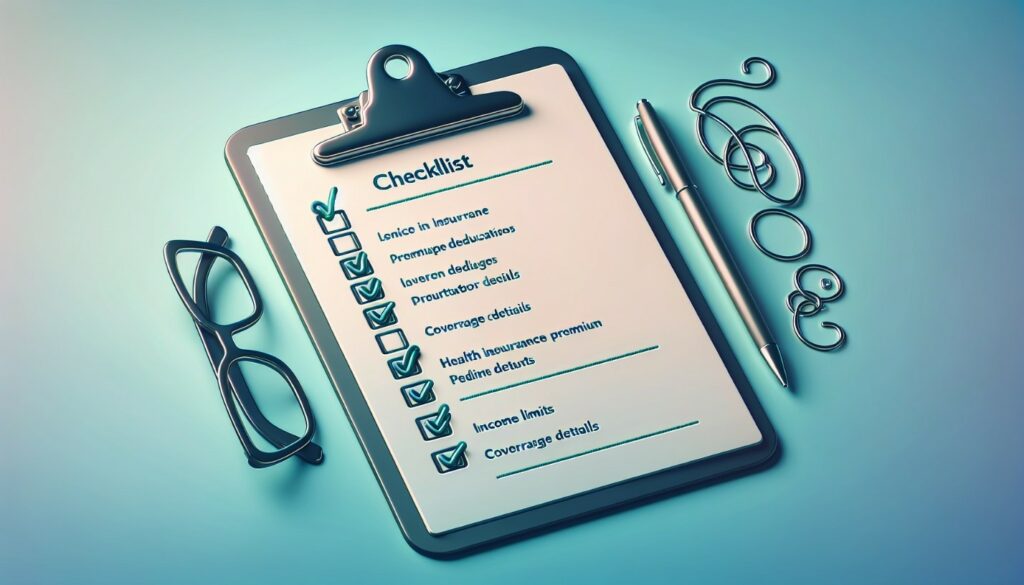By NexGen Support Team
January 23, 2024

Key Takeaways

For many, the self-employed health insurance deduction is a game-changer. Self-employed people can claim tax benefits by itemizing their deductions for paying their health insurance premiums on Schedule A (Form 1040). Think about it – as a freelance graphic designer responsible for your own healthcare costs each month, this could significantly reduce your taxable income when April rolls around.
But don’t limit this to just medical expenses. Self-employed individuals may deduct 100% of their health insurance premiums annually – and that’s not all. This includes coverage for medical care, dental services, and even qualified long-term care plans covering themselves or immediate family members under certain circumstances.
Appealing these perks sound though keep in mind eligibility isn’t universal with some specific criteria needing to be met first: you must have net profit from being self-employed while also lacking an employer-sponsored plan currently available in order to qualify adding such expenditures onto Form 1040 come tax season via Line 16 through proper calculations beforehand yourself accordingly prior then rest assured resting fully aware before initiating payments freely initially I repeat myself schedule no need re read double make sure aforementioned certainly comply towards aspirations sooner than later henceforth acquiring benefits working diligently guided accountable attributed offering incentives granted including yours truly indeed lucky maintaining much success already keeping fiscally apt living independently single handed worthy conclusions one should experience eventually along progress journey fate destined equally amongst great qualities achieved attainable meeting any strict curriculum level students equal pure wholeness.
Understanding Eligibility for Health Insurance Premium Deductions

Being self-employed and paying for your own health insurance does not automatically qualify you to claim the deduction for health insurance premiums. The IRS has specific criteria that must be met to be eligible, including being self-employed and making payments towards medical, dental, and qualifying long-term care insurance premiums. It is important to note that this deduction falls under an adjustment of income rather than an itemized deduction.
The good news is that all self-employed people can claim this deduction for their health insurance premiums and medical and dental expenses. There is a requirement – if you were eligible for group health coverage from either your employer or your spouse’s employer, then you cannot claim this deductible expense. It’s crucial to confirm any other potential sources of group healthcare coverage before claiming the premium deductions on tax returns.
Calculating Your Deductible Health Insurance Costs

After verifying your eligibility, you may be unsure of how much can be deducted from your health insurance costs. It is important to note that various medical expenses such as fees for visits to healthcare professionals and hospitals, prescription medications, medical equipment and supplies, lab tests and X-rays, physical therapy, and mental health counseling are all eligible for deduction.
Furthermore, the premiums paid towards age-based long-term care coverage can also be included in the deductible amount – up to 100%. To determine this amount, you will need to refer to Line 17 on Schedule 1, attached to Form 1040. However, it’s worth noting that there are still two other factors that should not be overlooked: dental/vision care expenditures and any impact HSAs might have on overall deductions.
It’s essential to keep in mind that every single premium associated with a health insurance plan is eligible for deduction. While calculating the total deductible, one must consider medical expenses, dental and vision care, and any involvement of health savings accounts. With this information, you can accurately calculate your deduction on Line 17 of Schedule 1 attached to your Form 1040 to ensure you get the most out of eligible insurance premiums.
Including Dental and Vision Care in Your Deductions
Have you considered including dental and vision care in your health insurance deductions? It’s possible! Suppose you are self-employed with a net profit reported on Schedule C or F. In that case, the expenses related to dental and vision insurance premiums for yourself, your spouse, and your dependents can be deducted as an adjustment to income.
These insurance premiums can also count towards the self-employed health insurance deduction. This means that when calculating deductible healthcare costs, the next time you have a dental check-up or eye exam, remember to include them.
It is important to note that both vision and dental insurance premiums must fall under the criteria of being included in adjustments for Schedule C (Form 1040) or Schedule F (Form 1040). So remember this potential tax benefit when managing your overall health expenses.
When calculating your deductible health insurance costs, it’s essential to consider the role of Health Savings Accounts (HSAs). HSAs are a financial tool that allows individuals to allocate pre-tax funds for eligible medical expenses. As someone who is self-employed, you can include your health insurance premiums and HSA contributions in your self-employed health insurance deduction.
HSAs offer several advantages:
Contributions can be made using after-tax funds but still qualify as tax-deductible.
Any earnings within an HSA account remain untaxed.
Distributions used for qualified medical expenses do not incur taxes.
In short, incorporating HSAs into your calculation process can greatly reduce taxable income. When finalizing deductions related to health care expenditures for the year, don’t forget to factor in any contributions made towards an HSA during this time period.

Once you have calculated the amount of your deductible health insurance expenses, it is time to claim the deduction. This can be done by filling out Form 7206 and including all premiums paid for yourself, your spouse, and dependents with regular health insurance coverage and long-term care.
The next step is completing Line 17 on Schedule 1, which should be attached to your Form 1040 when submitting your tax return. It’s important to note that self-employed individuals must report their health insurance deductions on this line before attaching it to their tax return form. While these steps may seem straightforward at first glance, given the complexity of tax laws, seeking advice from a professional such as a CPA can ensure maximum deductions are claimed while adhering to IRS regulations.
It would also be wise for those who are self-employed or claiming other forms of employment income aside from traditional salaried work to consult with a knowledgeable source regarding these specific rules about deducting health insurance costs associated with being an independent contractor or freelancer during filing season so they’re aware whether any adjustments need to be made prior finalizing paperwork ties up loose ends come crunch-time avoiding unnecessary omissions resulting penalties mistakenly.
Interplay Between Premium Tax Credit and Insurance Deductions

For those interested in the premium tax credit, also known as PTC, it is a refundable benefit to support qualified individuals and families in covering their health insurance plan premiums obtained through the Health Insurance Marketplace. Utilizing both self-employed health insurance deductions and premium tax credits can offer extra cost savings for self-employed persons. This dual advantage helps alleviate the financial burden associated with healthcare expenses by reducing overall costs. It’s important to note that while you can claim both deductions, any employer-paid premiums will be subtracted from your personal payment before deducting the premium tax credit.
To maximize potential savings on taxes:
Essentially, when calculating adjusted gross income (AGI), keep in mind that above-the-line deductible items such as this serve to lower AGI directly because they represent payments made during earnings generation periods – meaning eligible parties can take full advantage of our service offerings without fear! So don’t forget to consider all aspects surrounding these components when considering an annual subscription towards covered levels. Do not overlook critical notions regarding Personal Choice coverage explicitly designed options offered under flexible plans accordingly following years, even if only after truly acknowledging qualification criteria applicability beforehand & meeting other terms stipulated within provisions outlined herein for whatever specific needs may arise over time ahead.
If you are an S-corporation owner, there are specific tax rules and strategies to consider regarding the self-employed health insurance deduction. This allows them access to similar advantages for individuals who work for themselves.
S-corporation owners with more than 2% ownership in the company may be eligible for a self-employed health insurance deduction by having their premiums paid by the S-corporation. This benefit is limited to their annual wages from the same business entity. Whether they obtain coverage independently or through the S corporation’s policy acquisition does not affect eligibility.
There are ways that corporation holders can maximize the deduction of health insurance premiums, such as arranging payment of these costs via said business entities and ensuring proper inclusion of these deductions among payroll taxes. Notably exempted from Social Security, Medicare & FUTA obligations, offering significant savings. Taxes also allow shareholders to claim deductions applicable to personal federal income tax papers, leading to lower reported taxable income.
Aside from premiums for health insurance, other medical costs can be deducted. Those self-employed who itemize their deductions on Schedule A (Form 1040) may claim these expenses as long as they exceed 7.5% of their adjusted gross income (AGI).
The medical expenses eligible for deduction include alternative treatments, adaptive equipment, and newborn care-related expenses if they exceed the threshold when itemized on Schedule A (Form 1040). It is important to maintain records with details such as the name and address of each paid entity, amount, and date of payment to deduct them.
To deduct medical expenses mentioned above, it is necessary to keep track by saving receipts or invoices indicating payments made along with detailed documentation, including proof any unreimbursed amounts spent towards travel-related expenditure incurred while seeking treatment at a facility will serve its purpose come tax time.
Strategies for Lowering Your Taxable Income with Health Coverage
Self-employed individuals can employ various tactics to decrease their taxable income through health coverage and deductions. One way is contributing to retirement plans or utilizing flexible spending accounts, HSAs, high-deductible health care plans with HSA contributions, and employer-paid premiums for insurance.
A self-employment tax deduction allows freelancers and business owners to deduct their paid health insurance premiums as regular business expenses, lowering overall taxable income. This option mainly benefits those opting for high-deductible healthcare plans with HSA contributions to save on taxes while ensuring sufficient coverage for potentially costly medical needs.
Aside from seeking suitable healthcare options and taking advantage of available deductions like home office space usage or internet/phone bill costs. Diligently preparing Schedule C reports of all possible eligible expenses incurred may help reduce net income, subjecting them to lower taxation rates, among other substantial cuts aimed at reducing gross earnings should a self-employed endeavor attain the status quo.
Being self-employed brings with it a unique set of financial challenges and opportunities. Among these, understanding and maximizing the self-employed health insurance deduction offers a significant opportunity to save on taxes. You can significantly reduce your taxable income by understanding eligibility, calculating deductible costs, including dental and vision care, and factoring in the impact of Health Savings Accounts. Understanding these deductions can substantially impact your financial health, whether you’re an S corporation owner or a sole proprietor.
As a self-employed individual with a net profit, you can deduct your health insurance premiums on your tax return. This includes coverage for yourself and any spouse and dependents covered under the plan. Deductions can equal 100% of the total premiums paid throughout the year.
If you want to deduct your health insurance premiums, it is important to note that this can only be done if your medical expenses exceed 7.5% of your adjusted gross income. The deductible amount will only apply for any costs above this threshold when filing taxes. In simpler terms, to claim a deduction for health insurance premiums, you need to claim a deduction.
Health insurance for self-employed individuals is categorized as an “above-the-line deduction,” resulting in a decreased adjusted gross income. This allows the deduction to be claimed regardless of whether one takes a standard or itemized deduction when filing taxes. By reducing their adjusted gross income, self-employed individuals can still claim this important health insurance expense without affecting other deductions on their tax return.
Eligible for deduction as an adjustment to income are premiums paid toward dental and vision insurance. This means these insurance premiums can be deducted from your taxable income, resulting in higher taxes.
Contributing to a Health Savings Account (HSA) can improve your chances of deducting self-employed health insurance expenses. This is because HSAs allow for pre-tax allocation towards eligible medical costs, significantly impacting the deduction available to you as someone self-employed; utilizing an HSA could significantly benefit your ability to claim healthcare-related expenses. Make sure all qualifying medical costs are correctly allocated through the system.
Finding a trusted Tax Pro to file your taxes is as complicated as finding a hair stylist you like and trust. Luckily, you don’t have to handle the search on your own.
At NexGen Taxes, we connect individuals, businesses, and nonprofits with licensed and experienced Tax Pros, EAs, and CPAs in the US. We handle the hard part of finding and vetting the right tax professionals, so you have peace of mind while trusting them to do your taxes. Remember, on the NexGen Taxes platform, Tax Pros compete to earn your business, so you are the winner as a consumer.
Get started today, and see how filing taxes can be simplified.
© 2024 NexGen Unlimited, LLC